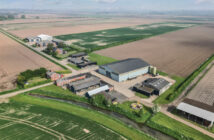Third generation arable farmer, and one half of the Wrights Agriculture father-and-son team, Eric Wright, has been crowned the BASIS Best Farmer of the Year. A&AF finds out more about how he came to win the award.
Mr Wright and his father contract farm over 2600ha across 15 different parcels of land within a 20-mile radius of Melton Mowbray, Leicestershire. The pair predominantly grow winter oilseed rape, winter and spring cereals as well as beans, oats and peas.
But it was winter OSR that took the real focus of Mr Wright’s BASIS project that helped him secure the BASIS Best Farmer of the Year Award.
“I believe my project findings have given me the backing to demonstrate industry need for a key herbicide that has recently lost the approval for use on winter OSR. It has also opened a door for me to play a part in influencing future legislation.”
Agronomy training
Mr Wright graduated with a degree in agricultural engineering from Harper Adams University in 2009 and decided to continue his education by enrolling in the BASIS Certificate in Crop Protection course at the University of Lincoln in June 2017.
The certification is tailored to individuals who wish to become sellers of plant protection products or advise on their use in agriculture and incorporates a wide spectrum of modules to give an in-depth understanding of crop protection and pest management. The examination is assessed in four elements: a multiple-choice question paper, a practical identification test, a project, three field vivas and a panel viva.
“I decided to take the course to broaden my agricultural knowledge and develop my agronomic understanding, to help enhance the business,” says Mr Wright.
“I think it’s increasingly important for arable farmers to be more aware of their practices, to ensure they’re working sustainably and efficiently. This also means that they don’t need to solely rely on their agronomist to tell them what to do.
“For example, the knowledge I gained on the training course has allowed me to work more closely with my agronomist and challenge his advice, where appropriate, so we can now make informed decisions as a team, which is really valuable,” says Mr Wright.
He adds that he particularly enjoyed carrying out the research project aspect of the course. “My project focused on the outcome of introducing Avadex (Tri-allate) to a blackgrass control strategy in winter OSR, which was particularly pertinent given the crop has recently been removed from the product label.
“With this recent label change in mind and the fact that winter OSR is a key source of income for us as well as many other farmers, I wanted to showcase the need for such a product.
“So, I evaluated all the products currently available for blackgrass control and was able to prove that Avadex is a vitally important herbicide to tackle such a persistent weed in winter OSR crops. This enabled me to show that it’s a significant loss to growers at such a volatile time in the industry,” explains Mr Wright.
“This has given me the confidence and evidence that I need to try and make a change in the industry. I’m now hoping to present my project findings to Gowan, the Avadex manufacturer, to demonstrate the need to re-introduce winter OSR onto the label, as this could help farmers around the country to tackle the blackgrass challenge head-on.”
Award winner
BASIS CEO, Stephen Jacob, explains that Mr Wright was awarded the prestigious BASIS Best Farmer title because his passion for farming, innovative thinking and attention to detail shone through during the training, examination and project, which made him the ideal candidate.
“He’s a true ambassador to represent the upcoming generation of farmers, that are always in search of wider knowledge. This is extremely promising for an industry that’s under extreme pressure to improve efficiency while protecting the environment,” says Mr Jacob.
Each year, the prestigious award is sponsored by Bayer UK, who provided Mr Wright with an all-expenses-paid trip to the Oxford Farming Conference this January, where he had the opportunity to hear from a wide range of high-profile industry speakers.
Dr Julian Little, head of communications and government affairs at Bayer UK, says the organisation always looks to give back to the farming community.
“Sponsoring the BASIS Best Farmer award gives us the opportunity to provide a space at one of the most thought-provoking events of the year, to somebody that wouldn’t necessarily have the chance to attend.
“A huge thirst for knowledge and the drive for change were key attributes that helped Mr Wright to win the award. This, teamed with the stimulating conference experience, has inspired him to build on his learning and take his BASIS project one step further,” says Dr Little.
For more information on BASIS please visit the website at www.basis-reg.co.uk or contact 01335 343945.
BASIS Certificate in Crop Protection
- Courses can run for up to a total of 35 days
- The course is tailored to individuals who wish to become sellers of plant protection products and those giving advice on their use in agriculture, horticulture, amenity or forestry
- The BASIS Certificate in Crop Protection is the only recognised certificate for the sale, advice and supply of plant protection products to meet the legal requirements of the Plant Protection Products (Sustainable Use) Regulations 2012, which transposes the Directive 2009/128/EC on the Sustainable Use of Pesticides.
- The exam comprises of four elements: a multiple-choice question paper, a practical identification test, a project as well as three field station vivas and a panel viva
- The course accrues 30 BASIS CPD points and 30 academic credits
- Modules include:
- Integrated Farm Management
- Recognition and causes of crop disorders
- Recognition, biology and control of weeds, pests and diseases
- Composition, activity and persistence of pesticides, including biopesticides
- Application of plant protection products
- Safe use, handling, transport and storage of pesticides




